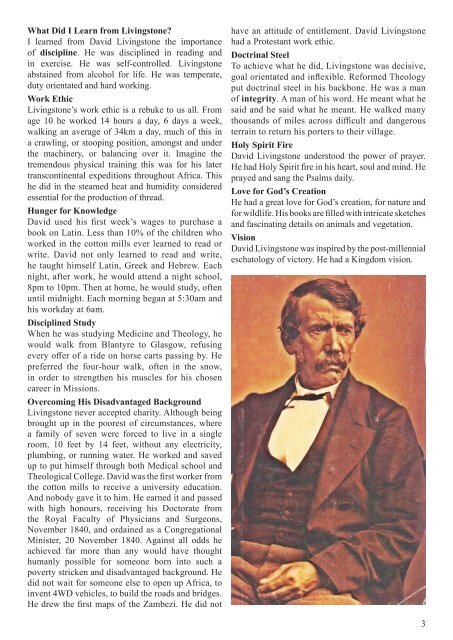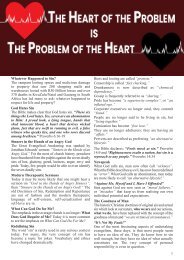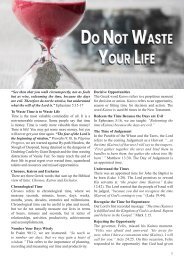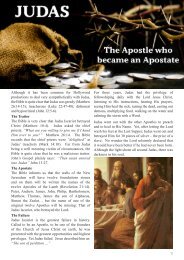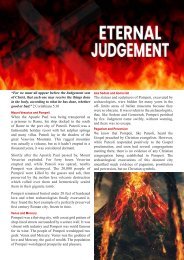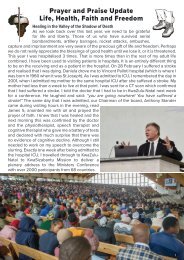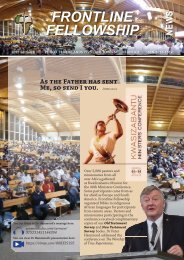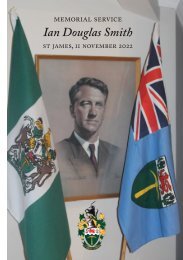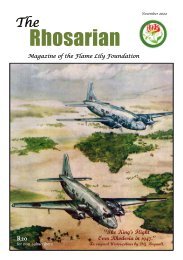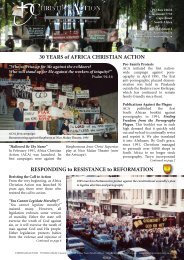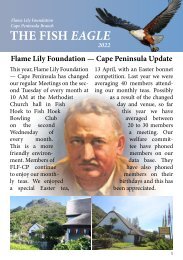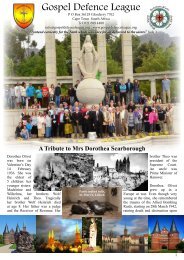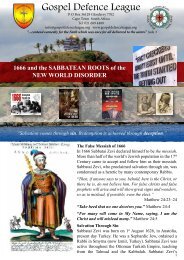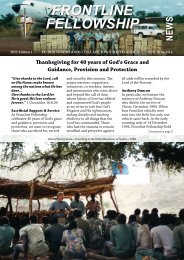What Would David Livingstone Say to us Today (Tract)
Create successful ePaper yourself
Turn your PDF publications into a flip-book with our unique Google optimized e-Paper software.
<strong>What</strong> Did I Learn from <strong>Livings<strong>to</strong>ne</strong>?<br />
I learned from <strong>David</strong> <strong>Livings<strong>to</strong>ne</strong> the importance<br />
of discipline. He was disciplined in reading and<br />
in exercise. He was self-controlled. <strong>Livings<strong>to</strong>ne</strong><br />
abstained from alcohol for life. He was temperate,<br />
duty orientated and hard working.<br />
Work Ethic<br />
<strong>Livings<strong>to</strong>ne</strong>’s work ethic is a rebuke <strong>to</strong> <strong>us</strong> all. From<br />
age 10 he worked 14 hours a day, 6 days a week,<br />
walking an average of 34km a day, much of this in<br />
a crawling, or s<strong>to</strong>oping position, amongst and under<br />
the machinery, or balancing over it. Imagine the<br />
tremendo<strong>us</strong> physical training this was for his later<br />
transcontinental expeditions throughout Africa. This<br />
he did in the steamed heat and humidity considered<br />
essential for the production of thread.<br />
Hunger for Knowledge<br />
<strong>David</strong> <strong>us</strong>ed his first week’s wages <strong>to</strong> purchase a<br />
book on Latin. Less than 10% of the children who<br />
worked in the cot<strong>to</strong>n mills ever learned <strong>to</strong> read or<br />
write. <strong>David</strong> not only learned <strong>to</strong> read and write,<br />
he taught himself Latin, Greek and Hebrew. Each<br />
night, after work, he would attend a night school,<br />
8pm <strong>to</strong> 10pm. Then at home, he would study, often<br />
until midnight. Each morning began at 5:30am and<br />
his workday at 6am.<br />
Disciplined Study<br />
When he was studying Medicine and Theology, he<br />
would walk from Blantyre <strong>to</strong> Glasgow, ref<strong>us</strong>ing<br />
every offer of a ride on horse carts passing by. He<br />
preferred the four-hour walk, often in the snow,<br />
in order <strong>to</strong> strengthen his m<strong>us</strong>cles for his chosen<br />
career in Missions.<br />
Overcoming His Disadvantaged Background<br />
<strong>Livings<strong>to</strong>ne</strong> never accepted charity. Although being<br />
brought up in the poorest of circumstances, where<br />
a family of seven were forced <strong>to</strong> live in a single<br />
room, 10 feet by 14 feet, without any electricity,<br />
plumbing, or running water. He worked and saved<br />
up <strong>to</strong> put himself through both Medical school and<br />
Theological College. <strong>David</strong> was the first worker from<br />
the cot<strong>to</strong>n mills <strong>to</strong> receive a university education.<br />
And nobody gave it <strong>to</strong> him. He earned it and passed<br />
with high honours, receiving his Doc<strong>to</strong>rate from<br />
the Royal Faculty of Physicians and Surgeons,<br />
November 1840, and ordained as a Congregational<br />
Minister, 20 November 1840. Against all odds he<br />
achieved far more than any would have thought<br />
humanly possible for someone born in<strong>to</strong> such a<br />
poverty stricken and disadvantaged background. He<br />
did not wait for someone else <strong>to</strong> open up Africa, <strong>to</strong><br />
invent 4WD vehicles, <strong>to</strong> build the roads and bridges.<br />
He drew the first maps of the Zambezi. He did not<br />
have an attitude of entitlement. <strong>David</strong> <strong>Livings<strong>to</strong>ne</strong><br />
had a Protestant work ethic.<br />
Doctrinal Steel<br />
To achieve what he did, <strong>Livings<strong>to</strong>ne</strong> was decisive,<br />
goal orientated and inflexible. Reformed Theology<br />
put doctrinal steel in his backbone. He was a man<br />
of integrity. A man of his word. He meant what he<br />
said and he said what he meant. He walked many<br />
tho<strong>us</strong>ands of miles across difficult and dangero<strong>us</strong><br />
terrain <strong>to</strong> return his porters <strong>to</strong> their village.<br />
Holy Spirit Fire<br />
<strong>David</strong> <strong>Livings<strong>to</strong>ne</strong> unders<strong>to</strong>od the power of prayer.<br />
He had Holy Spirit fire in his heart, soul and mind. He<br />
prayed and sang the Psalms daily.<br />
Love for God’s Creation<br />
He had a great love for God’s creation, for nature and<br />
for wildlife. His books are filled with intricate sketches<br />
and fascinating details on animals and vegetation.<br />
Vision<br />
<strong>David</strong> <strong>Livings<strong>to</strong>ne</strong> was inspired by the post-millennial<br />
escha<strong>to</strong>logy of vic<strong>to</strong>ry. He had a Kingdom vision.<br />
3


